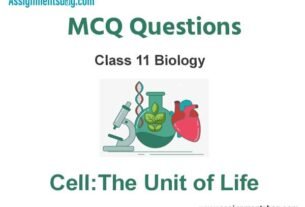Please refer to MCQ Questions Chapter 4 Childhood Class 11 English with answers provided below. These multiple-choice questions have been developed based on the latest NCERT book for class 11 English issued for the current academic year. We have provided MCQ Questions for Class 11 English for all chapters on our website. Students should learn the objective based questions for Chapter 4 Childhood in Class 11 English provided below to get more marks in exams.
Chapter 4 Childhood MCQ Questions
Please refer to the following Chapter 4 Childhood MCQ Questions Class 11 English with solutions for all important topics in the chapter.
MCQ Questions Answers for Chapter 4 Childhood Class 11 English
Question. When did the poet begin to feel that his childhood was lost?
(a) When he went on a trip
(b) When he saw the reality of life
(c) When he called his parents
(d) When he read more books
Answer
B
Question. Markus Natten says that his childhood has gone to an ‘unremembered place’. Which option indicates the significance of ‘unremembered place’?
(a) Childhood is not lost to the rational world.
(b) Childhood is nowhere visible in the hypocritical world.
(c) The loss of childhood is permanent.
(d) Both (a) and (c)
Answer
C
Question. The literary device ‘refrain’ is used in the poem ‘Childhood’ in the line
(a) When did my childhood go?
(b) Hell and Heaven
(c) Could not be found in Geography
(d) That’s all I know
Answer
A
Question. Which of these is NOT one of the options where the poet thinks that his childhood has gone?
(a) The time when he ceased to be twelve
(b) The time when he realised that hell and heaven could not be found in Geography
(c) The time when he realised that adults were hypocrites
(d) None of the above
Answer
A
Question. Select the word that suits the poet’s description of adults.
(a) Cunning
(b) Intelligent
(c) Smart
(d) Pretentious
Answer
D
Question. Select the suitable option for the given statements, based on your reading of ‘Childhood.’
(i) The poet states that the childhood innocence and the happiness is lost as one becomes an adult.
(ii) The poet want the childlike innocence and happiness to remain forever.
(a) (i) is true but (ii) is false
(b) Both (i) and (ii) are true.
(c) (ii) is a fact but unrelated to (i).
(d) (i) is the cause for (ii).
Answer
A
Question. What did the poet sense about himself when he realised he could use his own mind the way he wants?
(a) He sensed that he is as intelligent as his friends
(b)He sensed his own individuality and a separate personality
(c) He sensed that he is very smart
(d) He sensed that he could use his mind in creative work
Answer
B
Question. What is the tone of the poem?
(a) Inspiring
(b) Challenging
(c) Hopeful
(d) Nostalgic
Answer
D
Question. The repetition of the questions shows that the poet is …………… .
(a) helpless
(b) excited
(c) stubborn
(d) desperate
Answer
D
Question. Select the option that justifies ‘To use whichever way I choose’.
(a) To form perspective
(b) To create newer ideas
(c) To question
(d) All of the above
Answer
D
Question. What did the poet believe about Hell and Heaven when he was a child?
(a) That they were actual places
(b) That they were imaginary
(c) That they belong to the Church
(d) That they were in America
Answer
A
Question. The poet’s trust on adults breaks because ……… .
(a) they lie to the poet
(b) they preach love and fail to act on love
(c) they are selfish
(d) they are lazy
Answer
B
Question. What are the aspects of adulthood that are discussed in the poem?
I. Individuality II. Bravery
III. Rationality IV. Hypocrisy
(a) I and II
(b) I, II and IV
(c) III and II
(d) I and III
Answer
D
Question. Antithesis is where two opposite words are used together in a sentence in a poem. Where did the poet use it?
(a) Infant’s face
(b) Forgotten place
(c) Hell and Heaven
(d) Preached of love
Answer
C
Question. Where could he see his childhood now?
(a) In an infant’s face
(b) Only in his memories
(c) Nowhere
(d) Only in the poem
Answer
A

